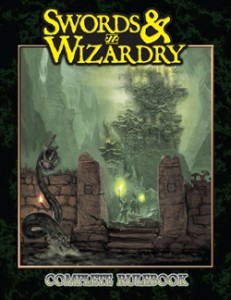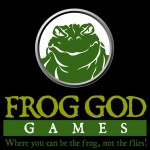I just finished all 15 illos for the Frog God Monstrosities book. Here is another sample:
[singlepic id=219 w=320 h=240 float=center]
orc, 9×12, ink on paper.
More info on the book:
The Book will be published by Frog God Games:
This book expands the Swords and Wizardry Core Rules (http://www.swordsandwizardry.com/) to cover all of the early phase supplements from the 1970’s. It creates a 1-volume resource allowing the players and game masters alike to create and run adventures and campaigns that will last for an entire lifetime. The game is supported by a vast array of adventures, and other resources that are produced by Frog God Games.
This is the game you played 20 years ago. It’s true to the original style and philosophy that made the game great. No “Spot Checks” here. Simple, flexible rules that allow players and game masters alike to roll play and roleplay. This stand-alone tome provides all the rules you need to play the game. Its easily transferable as a rules set for other retro-clone games as well as those old dusty modules you still have in the attic.
In 1974, Gary Gygax (1938-2008) and Dave Arneson (1947-2009) wrote the world’s first fantasy role-playing game, a simple and very flexible set of rules that launched an entirely new genre of gaming. In the year 2000, Wizards of the Coast, Inc. (holder of the “Dungeons & Dragons” trademark) released the “Open Game License,” which allows third parties, like us, to use various intellectual properties historically associated with the Dungeons & Dragons game – although not the actual trademarked name itself, and with specific terms and restrictions.
This book is an unofficial, “re-stated” version of the original Gygax & Arneson rules (0e), created using the Open Game License. This original game consisted of a boxed set of three booklets: Men & Magic, Monsters & Treasure, and The Underworld & Wilderness Adventures. Four supplements were also written by Gary Gygax, Rob Kuntz and others between 1975 and 1977, containing options for expanding the game with new rules. Collectively, all those booklets are often referred to as “0e,” standing for “zero edition,” and we mention the “Original Game” from time to time in this book, as a reference point. Swords & Wizardry re-describes selected rules from all seven of the Original Game booklets, taking some and leaving some. In general, Swords & Wizardry adopts class, monster, and spell rules from all the supplements, but sticks to the simpler combat mechanics from the boxed set and the first supplement only. Tim Kask, the first editor of the Dragon Magazine(TM), the first employee of TSR, Inc., and the editor of Supplements 2-4 for Original Dungeons & Dragons (TM), has more to say about that in the Foreword.


